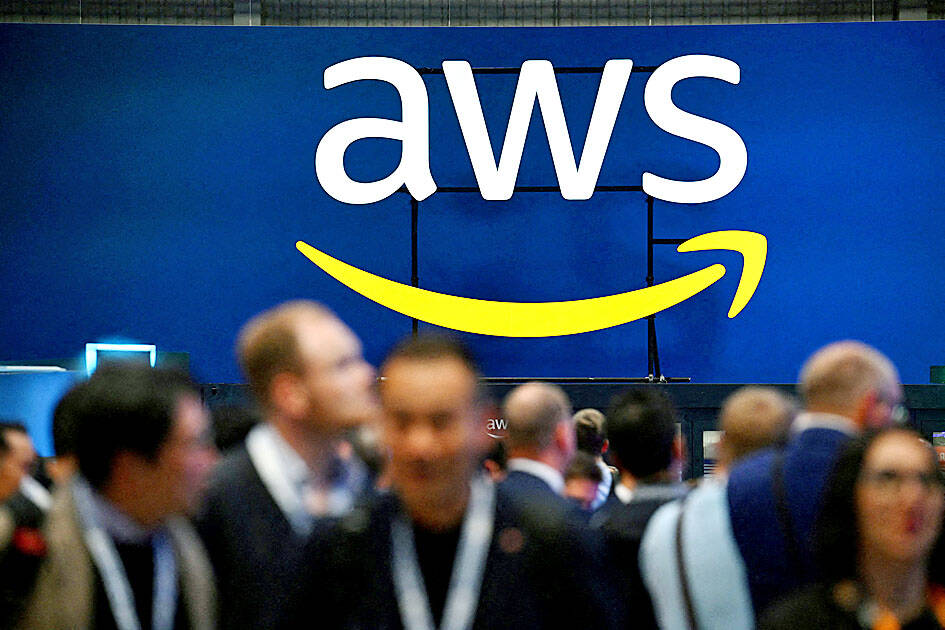Amazon Web Services (AWS) is planning to invest billions of dollars over the next 15 years to build data centers in Taiwan and create an infrastructure region in the country by early next year, the Amazon.com Inc cloud computing subsidiary said yesterday.
The new “AWS Asia Pacific (Taipei) Region” aims to help customers and AWS partners in Taiwan store their content securely and run cloud-enabled workloads with lower latency from data centers in Taiwan, the company said.
The project reflects AWS’ long-term commitment to Taiwan and the Asia-Pacific region amid growing demand for cloud services, it said.

Photo: Reuters
The move comes as Taiwan has become a major data center market for global cloud service providers amid rising demand for digital transformation, artificial intelligence and clean energy. In 2013, Google opened a data center in Changhua County, while Microsoft Corp is building a data center in Taoyuan that is scheduled to open later this year.
AWS provides customers computing, data storage, analytics, machine learning and artificial intelligence services from its data centers around the world.
In Taiwan, companies, including Taiwan Semiconductor Manufacturing Co (台積電), Chunghwa Telecom Co (中華電信), Cathay Financial Holding Co (國泰金控), Acer Inc (宏碁), Trend Micro Inc (趨勢科技) and Gamania Digital Entertainment Co (遊戲橘子), are using AWS’ services to deal with workloads.
AWS said it has steadily increased its investment in Taiwan since 2014, with the launch of “Local Zones” in Taipei in 2022, its most recent major infrastructure deployment in the country.
Compared with Local Zones, the AWS Asia Pacific (Taipei) Region’s data center would be larger in scale, and can provide customers with low latency, high-speed transmission services because it stores data domestically, it said.
The new AWS region in Taiwan would consist of three “Availability Zones” at launch, the company said.
Currently, AWS operates 105 Availability Zones in 33 geographic regions globally, it said.
Availability Zones feature infrastructure in separate and distinct geographic locations, with the zones far enough from each other to support customers’ business continuity, while being close enough to provide low-latency access for high availability applications that use multiple Availability Zones, AWS said.
Each zone has independent power, cooling and physical security and is connected through redundant, ultra-low-latency networks, it said, adding that customers could design their applications to run in multiple zones to achieve a greater fault tolerance.
“With today’s announcement, AWS has plans to launch 21 more Availability Zones and seven more AWS Regions in Malaysia, Mexico, New Zealand, the Kingdom of Saudi Arabia, Taiwan, Thailand and the AWS European Sovereign Cloud,” it said.

The US dollar was trading at NT$29.7 at 10am today on the Taipei Foreign Exchange, as the New Taiwan dollar gained NT$1.364 from the previous close last week. The NT dollar continued to rise today, after surging 3.07 percent on Friday. After opening at NT$30.91, the NT dollar gained more than NT$1 in just 15 minutes, briefly passing the NT$30 mark. Before the US Department of the Treasury's semi-annual currency report came out, expectations that the NT dollar would keep rising were already building. The NT dollar on Friday closed at NT$31.064, up by NT$0.953 — a 3.07 percent single-day gain. Today,

‘SHORT TERM’: The local currency would likely remain strong in the near term, driven by anticipated US trade pressure, capital inflows and expectations of a US Fed rate cut The US dollar is expected to fall below NT$30 in the near term, as traders anticipate increased pressure from Washington for Taiwan to allow the New Taiwan dollar to appreciate, Cathay United Bank (國泰世華銀行) chief economist Lin Chi-chao (林啟超) said. Following a sharp drop in the greenback against the NT dollar on Friday, Lin told the Central News Agency that the local currency is likely to remain strong in the short term, driven in part by market psychology surrounding anticipated US policy pressure. On Friday, the US dollar fell NT$0.953, or 3.07 percent, closing at NT$31.064 — its lowest level since Jan.

The New Taiwan dollar and Taiwanese stocks surged on signs that trade tensions between the world’s top two economies might start easing and as US tech earnings boosted the outlook of the nation’s semiconductor exports. The NT dollar strengthened as much as 3.8 percent versus the US dollar to 30.815, the biggest intraday gain since January 2011, closing at NT$31.064. The benchmark TAIEX jumped 2.73 percent to outperform the region’s equity gauges. Outlook for global trade improved after China said it is assessing possible trade talks with the US, providing a boost for the nation’s currency and shares. As the NT dollar

The Financial Supervisory Commission (FSC) yesterday met with some of the nation’s largest insurance companies as a skyrocketing New Taiwan dollar piles pressure on their hundreds of billions of dollars in US bond investments. The commission has asked some life insurance firms, among the biggest Asian holders of US debt, to discuss how the rapidly strengthening NT dollar has impacted their operations, people familiar with the matter said. The meeting took place as the NT dollar jumped as much as 5 percent yesterday, its biggest intraday gain in more than three decades. The local currency surged as exporters rushed to